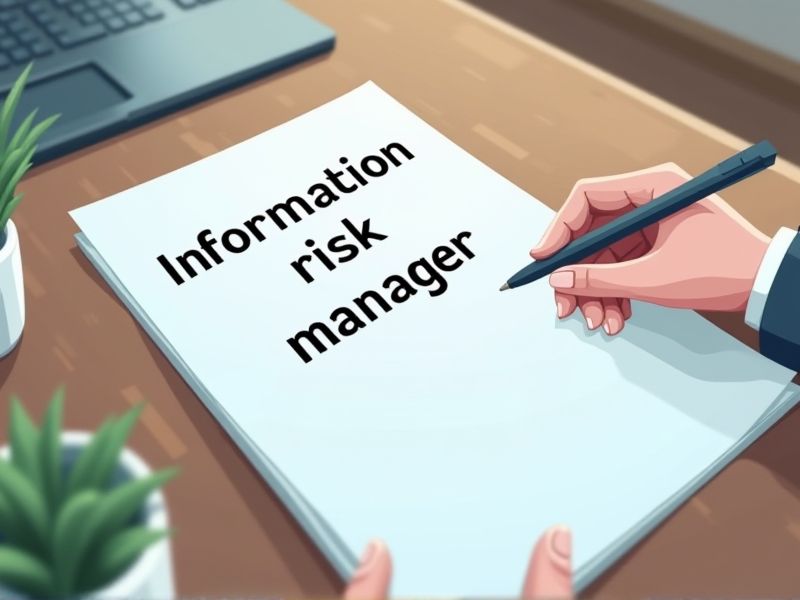
In the evolving landscape of digital threats, information technology risk managers play a vital role in safeguarding organizations from potential vulnerabilities. Certifications ensure these professionals possess the standardized skills and knowledge required to effectively identify, assess, and mitigate IT risks. Industry-recognized credentials often lead to enhanced career opportunities and increased trust from stakeholders. Below are some crucial certifications that an information technology risk manager may need.
Certified in Risk and Information Systems Control (CRISC)
Obtaining the Certified in Risk and Information Systems Control (CRISC) credential equips IT risk managers with enhanced skills to identify and evaluate IT risks effectively. The certification signifies expertise in designing and implementing information system controls to mitigate identified risks. With the growing complexity of IT landscapes, CRISC holders are recognized for their ability to ensure systems' integrity and confidentiality. Organizations often require this certification for IT risk managers, given its focus on aligning IT risk management with overall business objectives.
Certified Information Systems Auditor (CISA)
Certified Information Systems Auditor (CISA) certification enhances an IT risk manager's credibility, aligning their skills with recognized industry standards. This qualification equips professionals with crucial knowledge in auditing, control, and assurance, strengthening their ability to evaluate IT system integrity effectively. CISA holders are adept in identifying and mitigating risks, thus safeguarding organizational assets and ensuring compliance. The certification supports improved decision-making under IT governance frameworks, fostering a more secure and reliable technology environment.
Certified Information Systems Security Professional (CISSP)
CISSP certification provides IT risk managers with a comprehensive understanding of security architecture and effective risk management strategies. This credential validates their expertise in implementing robust security controls, crucial for safeguarding sensitive information. Organizations often prefer CISSP-certified professionals due to their proven capability in managing complex security challenges. Possessing CISSP equips risk managers with updated knowledge of industry standards and compliance requirements, enhancing their ability to protect organizational assets.
Certified Information Security Manager (CISM)
Information technology risk managers face complex security challenges, and having a Certified Information Security Manager (CISM) enhances their ability to develop robust security strategies. CISM certification provides in-depth knowledge of risk management, aligning IT security measures with business objectives. This certification also equips risk managers with advanced skills in governance and incident management, which are critical in mitigating threats. Organizations often prefer or require CISM-certified professionals to ensure a standardized, comprehensive approach to information security.
Certified in the Governance of Enterprise IT (CGEIT)
Certified in the Governance of Enterprise IT (CGEIT) equips Information Technology risk managers with critical skills in aligning IT governance with business objectives. This certification enhances a risk manager's ability to assess and mitigate IT-related risks, directly influencing organizational success. Furthermore, it validates the manager's expertise in enterprise IT governance, fostering stakeholder confidence. Having CGEIT certification often results in improved decision-making capabilities regarding IT risks and investment justifications.
Project Management Institute Risk Management Professional (PMI-RMP)
The PMI-RMP certification provides IT risk managers with a structured framework to identify and mitigate potential risks effectively. In the dynamic field of IT, staying ahead of potential threats requires specialized skills in risk assessment and mitigation strategies, which the PMI-RMP equips professionals with. Employers often seek certified professionals, as the credential signals a standardized level of expertise in managing risks. IT environments constantly evolve, and PMI-RMP-certified professionals ensure systemic and strategic risk management adaptation.
ISO/IEC 27001 Lead Implementer
The ISO/IEC 27001 Lead Implementer credential equips information technology risk managers with the expertise to implement robust information security management systems, ensuring systematic identification and mitigation of security risks. Holding this certification, risk managers can effectively align the organization's security measures with international standards, which enhances compliance and credibility. This knowledge enables risk managers to develop strategic security plans that reduce vulnerabilities, safeguarding critical business data and assets. The certification also prepares risk managers to respond adaptively to evolving cyber threats, thereby maintaining organizational resilience.
ISO/IEC 27001 Lead Auditor
An ISO/IEC 27001 Lead Auditor provides a structured framework for managing information security risks by ensuring compliance with international standards. Their expertise verifies that IT systems adhere to necessary controls, reducing the potential for data breaches. The Lead Auditor identifies gaps in the information security management system, allowing the IT risk manager to implement targeted improvements. Collaborating with a Lead Auditor enhances trust with stakeholders by demonstrating commitment to robust security practices.
CompTIA Security+
CompTIA Security+ offers a foundational understanding of security concepts, which is essential for an IT risk manager to assess and mitigate risks effectively. This certification covers important areas like network security, compliance, and threats, aligning with the core responsibilities of a risk manager. Possessing Security+ knowledge enhances the ability to develop and implement security protocols tailored to an organization's needs. Employers often seek candidates with Security+ certification, recognizing it as validation of crucial cybersecurity skills necessary for safeguarding information systems.
Certified Information Privacy Professional (CIPP)
The Certified Information Privacy Professional (CIPP) credential equips IT risk managers with a deep understanding of data protection and privacy laws. This knowledge is crucial for ensuring compliance and mitigating legal risks in data management practices. CIPP provides IT risk managers with the skills to identify and address privacy threats effectively. As privacy concerns escalate, having a CIPP-certified professional ensures that organizations are well-prepared to handle privacy-related incidents.
Summary
When you obtain certifications as an Information Technology Risk Manager, your expertise in risk assessment and management is enhanced. This certification can lead to increased trust from employers and colleagues, positioning you as a credible authority in IT risk management. You may experience career advancement opportunities and potentially higher compensation due to validated skills. Employers often prioritize certified professionals when assembling teams to handle complex IT risk scenarios.
